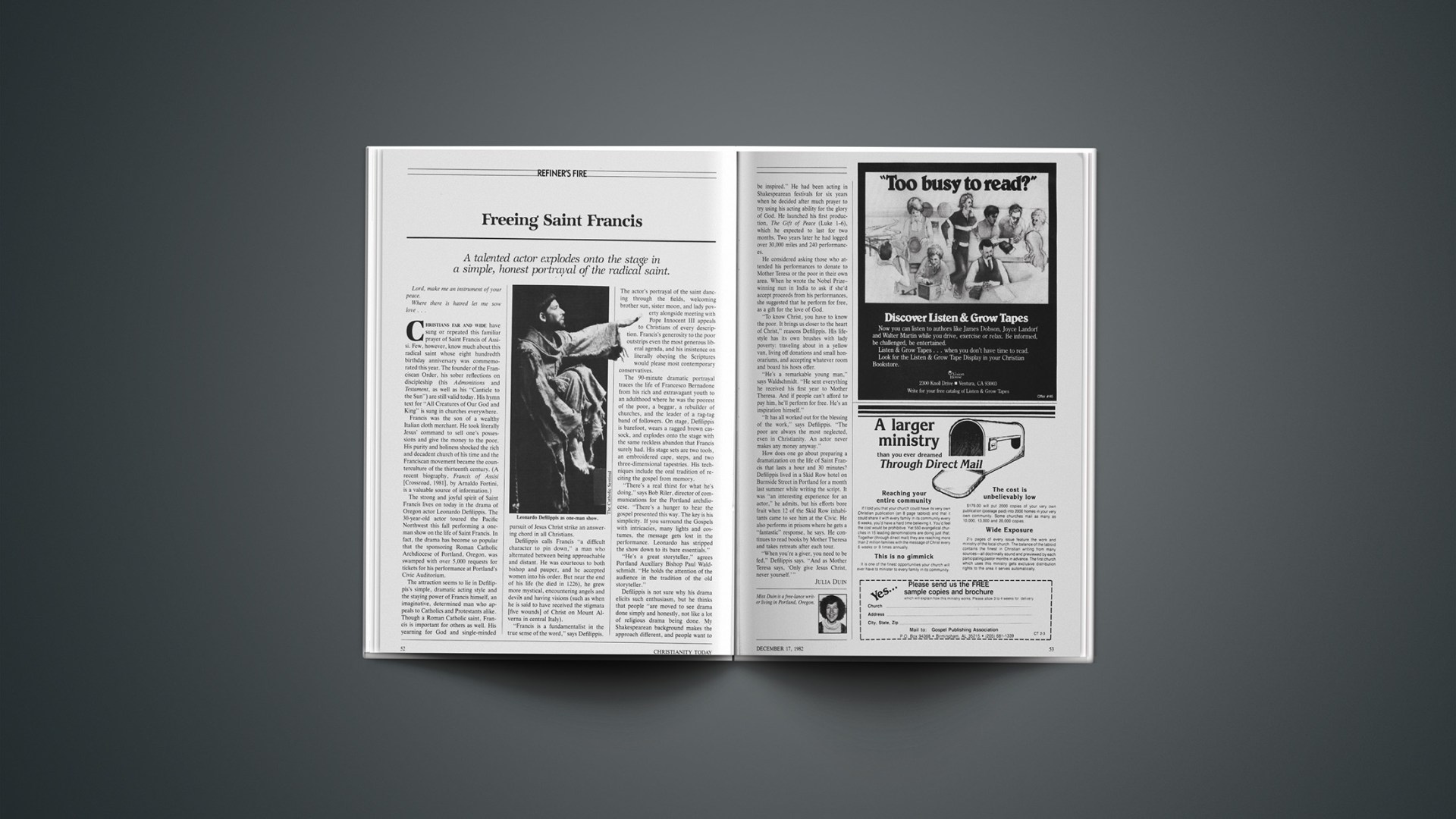A talented actor explodes onto the stage in a simple, honest portrayal of the radical saint.
Lord, make me an instrument of you peace.
Where there is hatred let me sow love …
Christians far and wide have sung or repeated this familiar prayer of Saint Francis of Assisi. Few, however, know much about this radical saint whose eight hundredth birthday anniversary was commemorated this year. The founder of the Franciscan Order, his sober reflections on discipleship (his Admonitions and Testament, as well as his “Canticle to the Sun”) are still valid today. His hymn text for “All Creatures of Our God and King” is sung in churches everywhere.
Francis was the son of a wealthy Italian cloth merchant. He took literally Jesus’ command to sell one’s possessions and give the money to the poor. His purity and holiness shocked the rich and decadent church of his time and the Franciscan movement became the counterculture of the thirteenth century. (A recent biography, Francis of Assisi [Crossroad, 1981], by Arnaldo Fortini, is a valuable source of information.)
The strong and joyful spirit of Saint Francis lives on today in the drama of Oregon actor Leonardo Defilippis. The 30-year-old actor toured the Pacific Northwest this fall performing a one-man show on the life of Saint Francis. In fact, the drama has become so popular that the sponsoring Roman Catholic Archdiocese of Portland, Oregon, was swamped with over 5,000 requests for tickets for his performance at Portland’s Civic Auditorium.
The attraction seems to lie in Defilippis’s simple, dramatic acting style and the staying power of Francis himself, an imaginative, determined man who appeals to Catholics and Protestants alike. Though a Roman Catholic saint, Francis is important for others as well. His yearning for God and single-minded pursuit of Jesus Christ strike an answering chord in all Christians.
Defilippis calls Francis “a difficult character to pin down,” a man who alternated between being approachable and distant. He was courteous to both bishop and pauper, and he accepted women into his order. But near the end of his life (he died in 1226), he grew more mystical, encountering angels and devils and having visions (such as when he is said to have received the stigmata [five wounds] of Christ on Mount Alverna in central Italy).
“Francis is a fundamentalist in the true sense of the word,” says Defilippis. The actor’s portrayal of the saint dancing through the fields, welcoming brother sun, sister moon, and lady poverty alongside meeting with Pope Innocent III appeals to Christians of every description. Francis’s generosity to the poor outstrips even the most generous liberal agenda, and his insistence on literally obeying the Scriptures would please most contemporary conservatives.
The 90-minute dramatic portrayal traces the life of Francesco Bernadone from his rich and extravagant youth to an adulthood where he was the poorest of the poor, a beggar, a rebuilder of churches, and the leader of a rag-tag band of followers. On stage, Defilippis is barefoot, wears a ragged brown cassock, and explodes onto the stage with the same reckless abandon that Francis surely had. His stage sets are two tools, an embroidered cape, steps, and two three-dimensional tapestries. His techniques include the oral tradition of reciting the gospel from memory.
“There’s a real thirst for what he’s doing,” says Bob Riler, director of communications for the Portland archdiocese. “There’s a hunger to hear the gospel presented this way. The key is his simplicity. If you surround the Gospels with intricacies, many lights and costumes, the message gets lost in the performance. Leonardo has stripped the show down to its bare essentials.”
“He’s a great storyteller,” agrees Portland Auxiliary Bishop Paul Waldschmidt. “He holds the attention of the audience in the tradition of the old storyteller.”
Defilippis is not sure why his drama elicits such enthusiasm, but he thinks that people “are moved to see drama done simply and honestly, not like a lot of religious drama being done. My Shakespearean background makes the approach different, and people want to be inspired.” He had been acting in Shakespearean festivals for six years when he decided after much prayer to try using his acting ability for the glory of God. He launched his first production, The Gift of Peace (Luke 1–6), which he expected to last for two months. Two years later he had logged over 30,000 miles and 240 performances.
He considered asking those who attended his performances to donate to Mother Teresa or the poor in their own area. When he wrote the Nobel Prize-winning nun in India to ask if she’d accept proceeds from his performances, she suggested that he perform for free, as a gift for the love of God.
“To know Christ, you have to know the poor. It brings us closer to the heart of Christ,” reasons Defilippis. His lifestyle has its own brushes with lady poverty: traveling about in a yellow van, living off donations and small honorariums, and accepting whatever room and board his hosts offer.
“He’s a remarkable young man,” says Waldschmidt. “He sent everything he received his first year to Mother Theresa. And if people can’t afford to pay him, he’ll perform for free. He’s an inspiration himself.”
“It has all worked out for the blessing of the work,” says Defilippis. “The poor are always the most neglected, even in Christianity. An actor never makes any money anyway.”
How does one go about preparing a dramatization on the life of Saint Francis that lasts a hour and 30 minutes? Defilippis lived in a Skid Row hotel on Burnside Street in Portland for a month last summer while writing the script. It was “an interesting experience for an actor,” he admits, but his efforts bore fruit when 12 of the Skid Row inhabitants came to see him at the Civic. He also performs in prisons where he gets a “fantastic” response, he says. He continues to read books by Mother Theresa and takes retreats after each tour.
“When you’re a giver, you need to be fed,” Defilippis says. “And as Mother Teresa says, ‘Only give Jesus Christ, never yourself.’ ”
Miss Duin is a free-lance writer living in Portland, Oregon.










